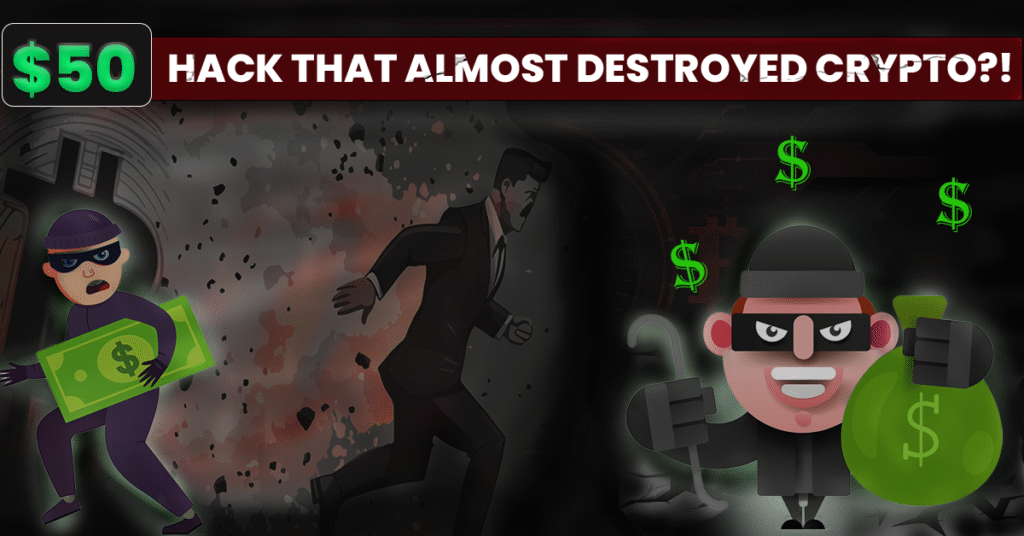
Within the glitzy and sometimes greedy world of cryptocurrency, hacker crimes taking off with millions in investment are gripping headlines. However, occasionally we see an event that has flipped that story–such as the recent largest NPM attack in crypto history, which, despite all odds, succeeded in looting under fifty dollars. Fifty dollars, you read that, yes.
This was not your usual cybercrime thriller- the tale combines the suspense of a supply chain attack, a list of favourite JavaScript packages long enough to make your head spin, and the irony of an almost catastrophic result with close to no physical theft.
A Ninja Hack in the Heart of Code
The entire incident began with a rogue phishing email deceiving a known NPM package maintainer into giving him the keys to the kingdom. Having a key to of the most important software libraries in the programming community, the attackers injected malicious code in 18 of the most popular JavaScript packages. These are not ordinary packages; they are the underdogs of millions of crypto wallets, apps, and decentralised finance (DeFi) projects you use daily.
Suppose that a hacker silently slips a secret message into a letter that billions of people are not going to read–they will base their precious crypto-transactions on it. This is what has happened here. The malicious code served as an evil crypto clipper that automatically replaced crypto wallet addresses so that funds could be diverted to the attacker’s pockets.
Billions of Downloads, But a Few Cents Won
And here is the punchline: they only snatched about five cents of Ethereum and some dollars of memecoins in spite of their grand stage, which is the busiest highway in the crypto universe. In total, the haul was so meagre as to make even the most amateur thief shudder–far less than fifty dollars.
What was the cause of such a huge attack with such small returns? The cybersecurity community attributes this to light-speed detection and containment. Security developers and companies leapt into action and issued global alerts and rolled back compromised packages. The attack was stopped cold almost as soon as it began, preventing any major damage.
The Real Heist? A Wake-Up Call
This might appear like a joke to be shared in security conferences, but the professionals feel it is not a joke. The incident revealed a scowling weakness in a system that is nearly too large to repair in one night. The magnitude of the attack, 18 hijacked packages, and 2 billion downloads each week were unparalleled, and it was a way to show just how fragile software supply chains actually are.
One security specialist has indicated that the small theft was more luck than skill. Had only the attackers been a bit faster or a bit more patient, we could be reading about a calamity of the proportions of the largest crypto heists ever, they thought. It is a sobering reminder of the fact that the mainstay of today’s software and, in particular, blockchain and crypto, can be ruined by a phishing email that found itself in the right place at the right time.
What This Means for Developers and Users
To programmers, this assault is a wake-up call to test every line of code that is external. To crypto users, it’s a wake-up call to always be cautious, always suspect where money is going, no matter how routine it may be. The community is currently scurrying about to better the defences, install superior monitoring devices, and educate maintainers on the dangers of phishing attacks.
In brief, the lessons on security are invaluable, as the thieves did not take more than a few coins as they left.
The Comedy and Irony of Cybercrime
It is almost poetry–the largest cargo hack ever of crypto-software, a payoff of less than a coffee. However, this odd conclusion points to the importance of an essential fact in cybersecurity, that attack size does not necessarily correlate with damage size.
Thus, as the crypto world began to rest and take a few jabs, it was obvious this was a close call of epic proportions. The following intruder may not be as fortunate, and the bet stakes will continue to increase.
Conclusion
Such an episode is an ideal combination of suspense, irony and relief. It highlights the need to have solid security behaviours in the wild west of Web3 technology by reminding us that, in some cases, the truth is stranger (and funnier) than fiction.
The following NPM attack could simply get in the headlines with all the bad things happening to it- or perhaps, just perhaps, it will be nothing to the story of this grand fifty-dollar robbery that rattled the blockchain world.
Source
A digital marketer possessing excellent knowledge and skill in off-page, on page and local SEO is competent in the challenging environment. Hard-working, energetic, and a quick learner for any task delegated. Enthusiastic to learn and constantly upgrade knowledge. Mohit brings over 2 years of experience in crafting content that not only ranks well but also provides valuable insights to readers.

